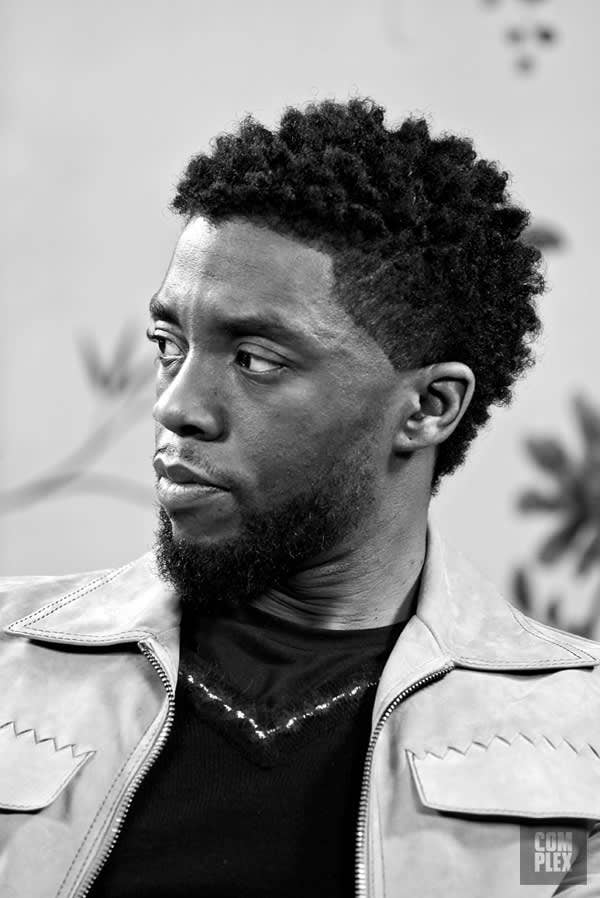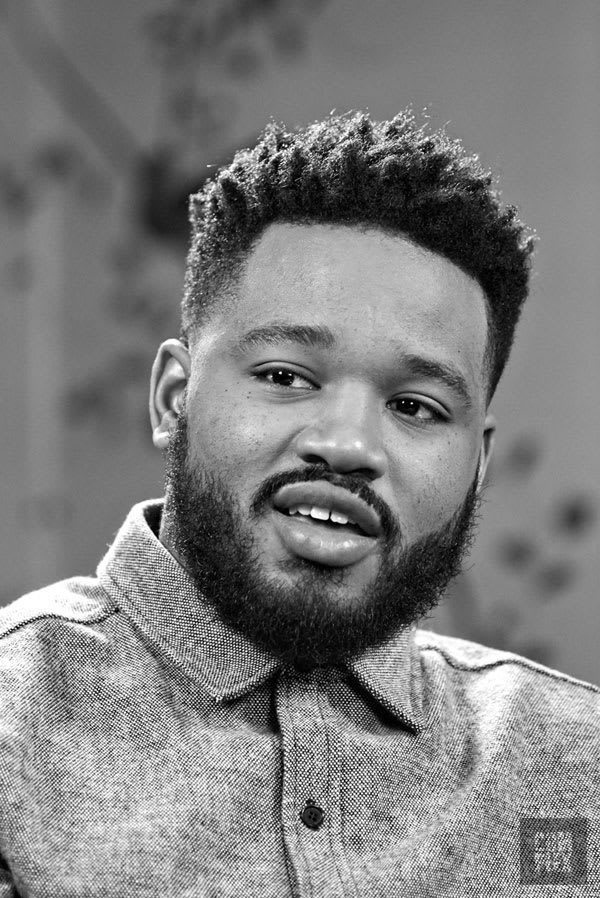Black Panther, The Moment—the celebration of the first black-led, black-directed, nine-figure blockbuster in history dropping smack dab in the center of Black History Month—almost didn't happen this perfectly. Marvel's byzantine programming schedule originally had the film set for release in November of 2017, then July. But the stars aligned to get the movie where it is today, the same fates that led Marvel head honcho Kevin Feige to Ryan Coogler when Ava DuVernay passed on it, setting up the young director for the biggest look of his career to date. And now here we are, with one of the year's most anticipated films dropping in the atypically good movie drought of February, a black excellence epic that muscles into Marvel Studios' top five easily and its top three arguably. (read our review here).
Creating a perfectly-timed moment is one thing, but living up to it is another, more difficult challenge by half. Co-writer/director Coogler and star of the show Chadwick Boseman both knew that presenting a black superhero on the biggest scale we've seen thus far (shoutout Wesley and Blade for being the first, though) was a Super Bowl moment. People are excited, yes, but they’re also expectant, with millions of eyes watching to see if you fumble. Failure at this high a level may not allow for a second chance. Ryan's directed crowd-pleasers before (see: Creed), but this is only his third film to date, with an even higher degree of difficulty. Chadwick confidently stole scenes in Black Panther’s Captain America: Civil War introduction, but carrying an entire blockbuster in a form-fitting panther suit is a taller order.
Complex sat down with Ryan and Chadwick five days before the film's release to discuss how they not only rose to the occasion, but exceeded it. Watch their interview with anchor Frazier Tharpe above, and find the condensed transcript of that conversation below.
The movie opens five days from now. How are you guys feeling?
Coogler: I’m nervous.
Boseman: Yeah, yeah a little bit.
How has the response been so far?
Boseman: The response has been great. I mean...I just figured out what it felt like in South Korea. It felt like we were The Beatles.
Were you expecting that kind of reaction or was it surreal?
Boseman: No, nothing can prepare for that, You know what I’m saying?
Coogler: They didn’t do me at the airport like they did y'all. I walked outta there smooth
Boseman: Oh boy. Yeah it was, it was crazy
Every superhero movie comes loaded with expectations and high stakes. This one feels like six or seven steps beyond that. When did the enormity of the moment kind of set in for both of you? Like that this was gonna be not just a superhero movie but like a cultural moment?
Boseman: Well I would say that I think that we were to some degree aware of it from the beginning right? Wouldn’t you say? That we knew that it would be culturally important? But maybe, not to this degree. I knew that it was important to me.
Coogler: That’s right. I would say for us it was important. But if the movie’s not good, none of that matters.
Boseman: None of that matters, yeah. I think our first conversation was about the fact that we had to make a superhero movie but here was this opportunity because of what it kinda was to tap into like, African culture in a way that you don’t usually get to do. But there’s no way of you knowing how other people are gonna feel about that. So we didn’t know that there would be this sort of movie-ment, you know, that’s happening in a way that we couldn’t… we could never foresee that. So you just doing the work, as he said, and trying to make sure you make a good film.
You mentioned your first conversation. Did you guys first meet as collaborators on this or had you already known each other before?
Boseman: Yeah, we just met. Yeah.
Coogler: You know as a director, casting your lead, that’s a big tool to have. So I was like, the lead is already casted in this film. I know [of] Chad. I had seen his work before. I knew he was amazing. But I hadn’t seen him in this. So I was like man I have to meet him though. Cause you know sometimes you meet somebody and you don’t get along.

Yeah, it doesn’t vibe.
Coogler: Yeah and that would be the worst thing. Like I couldn’t imagine making a movie where the director and the lead actor don’t vibe, you know? I’m sure it’s possible, but...
Boseman: It’s been done. (both laugh)
Coogler: And when we met, I think I was doing a junket similar to this for Creed. And Chad had to come meet me there cause I don’t live in LA. But like nobody could see him. There were cameras everywhere. So he snuck in the junket.
Boseman: It was a mission. It was a mission impossible.
Coogler: It was hella back rooms. There was like a triple knock at the door or something when I opened it. And I remember we just started talking and I was like, “Oh yeah I could do this.” Cause he was just saying really profound stuff. And everything that I liked about the character [it turned out] a lot of it was delivery choices on his behalf. And Chad got a lot of qualities to him, like you want actors to bring a piece of themselves to every role, you know? And it’s a lot of Chad in T’Challa. He comes from a big family. How many cousins you got, bruh? First cousins?
Boseman: I’m sketchy on one side. But it’s 41 on one side and think it’s 23 on the other side. (laughs)
Coogler: So he got a lot of weight to his life. He a cat that’s kind of wise beyond his years. Patient. But also there are a lot of the intangibles there and the respect and the knowledge of African culture.
I read that you actually took a trip to Africa to prepare for the film. How did that inform...
Boseman: We both did.
You went together?
Boseman: He took his own trip and I took mine. I took mine while I was preparing for Message From the King. For me, Message From the King was sort of like the local comedy club where you practice for your HBO or your Showtime special. So that’s where I went to found my dialect coach. Where I decided that this would be the way that T’Challa speaks. I spent a lot of time just thinking about the character, about both those characters, at that time and trying to make them different from each other. Going from Jacob King to T’Challa and Black Panther. So yeah that trip was instrumental.
Chadwick, this is the biggest movie that you’ve ever been apart of. Ryan, this is only your third movie. Were any parts of this experience overwhelming?
Coogler: It was hard everyday. We put Chad through hell, man, we buried him.
Boseman: You know for me all of it is flying. At the end of the day the challenge of it is flying. The Warrior Falls sequence, even though it was cold in the winter of Atlanta, and you know, you’re half naked in the water...At a certain point you have a moment out there where the sun is setting and it’s beautiful and you feel this euphoria while you're doing this. We had like hundreds of extras on the cliffs on the rocks out there and drums playing. So we had a musical set and in between takes you would have moments where everybody was just kinda partying to a degree. Just to keep the morale up and that energy gets flowing and starts to echo off of the rocks. And uh, you know, there was one moment where they were playing traditional African drums and it kinda turned into "Drop It Like It's Hot."

Ryan, you mentioned that Kendrick’s involvement in the soundtrack came after he saw the film. Did you watch him watch the movie? Like did you watch it together?Coogler: Yeah, yeah. We were in an editing suite. He came through with his collaborator, Dave Free. They came through. They like grabbed hella snacks. And just like came in the suite.
What were some of his reactions during crucial parts?
Coogler: It was just us in there so he would talk to the screen like we do, you feel me? He was also apprehensive, like he didn’t want to see it all. He was like "I don’t want to see it all because I know it’s not finished yet." He would hear sounds that Ludwig [Göransson] would put in his score. And he would ask about those and say he wanted those for his music. It’s a cue that goes for Dora Milaje. It’s like a “yip” that Ludwig recorded while he was in Senegal. Like when he heard the yip he was like, man, I need that. And they put it at the end of "King's Dead." But I mean look man, I really enjoyed spending time with him. Like he’s a real down to Earth cat. And you know, the coolest part about him is he really like a Compton cat. You know I’m from a similar place in the Bay Area. Listening to his music I was still surprised how down to Earth he was. He got a wild energy to him. He’s always working.
How did you guys approach this story in terms of educating the audience on who T'Challa is but also getting to the plot and moving the story along in a really efficient manner?
Coogler: It was trial and error. That was something we were modifying the whole time. Me and my co-writer Joe Robert Cole and the editors Michael Shawver and Debbie Berman. We were constantly trying to figure out how much do we need, how much do we not. That part is difficult. I’m a comic book guy so I know who the Black Panther is, I know what Vibranium is. But we're trying to make a movie for people who don’t know any of that. So it was like how much do we have to give to them, how much is too much. So you end up overcompensating and then pulling back until you find that sweet spot.
What’s the ideal cause and effect for you guys with this movie given its potential to open with such a big box office and acclaim?What do you hope happens after, what do you hope this movie is the catalyst for in regards to more black-led blockbusters?
Coogler: I’m a one foot in front of the other type of guy. I try to focus on what I can control, you know? I’ll put it to you like this, bruh. Was you an athlete coming up?
Nah.
Coogler: I played football my whole life. I played Wide Receiver. I used to run hitch runs a lot because I played slot. You know what a hitch route is?
Mmm?
Coogler: So it’s like you run like maybe five to ten yards down the field and you turn and you catch the ball and then you know I used to be pretty good at popping those into big runs. But every time I thought about what I was gonna do to the safety or the linebacker after I caught to ball, before I caught it, I dropped it.
Boseman: Yup, yup, yup.
Coogler: Like every time. And I dropped a lot of passes that way. Like oh yeah I feel its' open, Ima catch this then I'm finna hit the safety with a dead leg then I'ma hit the sideline. Then I drop it cause I didn’t just focus on just catching it, you know what I mean? So in filmmaking I try not to ever make that mistake. Like for us, our job is to make a good movie. That’s very hard to do. Especially with a film as complex as this one. Like we had our work cut out. I’m focused on that. We in press right now engaging with y'all. This is our focus right now. And what happens after that we don’t have no control over, man. We could idealize what could happen, but something in my gut tells me that’s not the right thing to do.
Boseman: Yeah and that’s the way I’ve gotten to this point. Very often people will ask me was it a lot of pressure to play this role and that role cause I've played real people.
Yeah: James Brown, Thurgood Marshall..
Boseman: Yeah so I think the way I’ve gotten through each one of those situations... of course you feel the initial pressure of it. But because you’re going from moment to moment you’re not worried about the long-term. So I don’t see any reason why I should change that at this moment. Because the expectations of, you know, what it’s gonna do to the industry and this, that and the other is very dangerous. It’s very dangerous to do that. Because then you’re accepting this as the win. And this is not the win. The win will come as people bring their own things to it. And they’ll be inspired by it. And then if they are who knows what will happen?
Coogler: This is just a step.
Boseman: It’s just a step

